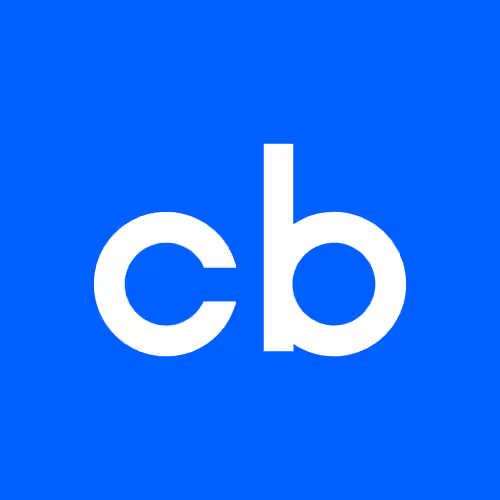Best AI CRM Tools of 2026
AI is turning CRMs from static databases into intelligent sales engines. See which AI CRM platforms are leading in 2025 and how to choose the right one.
Customer relationship management has evolved from static databases into intelligent sales engines. Traditional CRM systems stored customer data and tracked interactions, but they stopped short of real intelligence. AI-powered CRM systems now automate workflows, predict outcomes, and turn raw data into revenue-driving decisions.
The shift matters because sales teams lose hours to manual data entry, fragmented information, and guesswork-based forecasting. AI CRM software changes that by freeing sales reps from repetitive tasks, enabling real-time decision-making, and improving customer engagement through predictive analytics and automated outreach.
This article breaks down how artificial intelligence is redefining customer relationship management in practice. It examines the leading AI CRM tools shaping 2025, their core capabilities, and how they streamline every stage of the sales pipeline, from lead scoring and forecasting to personalized marketing campaigns and customer support. You’ll also find a comparison table covering pricing, functionality, and real-world use cases to help match the right platform to your business needs.
11x: The AI-Powered Pipeline Accelerator
Before exploring CRM platforms, consider how 11x transforms the data that feeds them. 11x’s digital workers, Alice and Julian, act as intelligent agents upstream of your CRM.
Alice operates as an autonomous AI SDR that identifies perfect-fit prospects, researches buying signals across multiple data sources, and sends personalized outreach at scale. Julian functions as an AI phone agent that qualifies inbound leads within seconds, nurtures stale prospects, and conducts follow-ups around the clock.
11 integrates bi-directionally with your CRM and hits all the security checkmarks, but the real advantage is far greater than integration alone. 11x replaces the patchwork of point tools many teams rely on for enrichment, prospecting, and outreach. Instead of stitching together multiple systems, it's all in one platform that autonomously identifies, qualifies, and engages leads before they ever reach your CRM. The result is a predictable stream of high-intent opportunities, already enriched and ready for conversion, eliminating manual data entry and accelerating pipeline growth from the start.
To see how Alice and Julian can generate a qualified pipeline for your team, book a live demo of 11x.
What Makes AI in CRM Different From Traditional Systems
Traditional CRM systems operate as repositories. They capture activity data and generate reports, but they depend on human review to derive meaning. AI-powered CRM platforms go several steps further by using artificial intelligence to automate workflows, interpret customer behavior, and optimize every stage of the sales process.
Predictive Analytics and Sales Forecasting
AI analyzes historical data to forecast revenue, identify at-risk deals, and recommend the best times for outreach. Teams gain accurate, data-backed projections instead of relying on intuition, improving resource planning and reducing missed opportunities.
Lead Scoring and Enrichment
Machine learning evaluates engagement signals such as opens, clicks, call responses, and website visits to qualify prospects automatically. This consistent scoring eliminates guesswork, guiding reps toward the highest-converting opportunities and lowering acquisition costs.
Generative AI and Conversation Intelligence
AI assistants draft outreach emails, summarize customer interactions, and transcribe calls to surface key insights. They identify sentiment trends, highlight objections, and recommend next steps, helping sales teams close deals faster and strengthen customer satisfaction.
Workflow Automation and Customer Support
AI automates end-to-end workflows, logging activities, updating records, routing leads, and sending timely follow-ups. Built-in chatbots resolve routine inquiries while AI agents prioritize escalations and deliver context-aware answers. This results in faster response times and improved retention.
Actionable Insights and Cost Efficiency
AI technology uncovers patterns across large volumes of data, turning every interaction into a performance signal. These insights inform marketing campaigns, fine-tune messaging, and reveal upsell opportunities. By replacing manual data entry, repetitive admin work, and multiple point tools, AI CRMs generate meaningful cost savings alongside stronger sales outcomes.
Together, these capabilities transform CRMs from static databases into intelligent copilots that simplify operations, optimize lead management, and drive measurable growth throughout the sales pipeline.
The Top AI CRM Tools for 2025
The influence of artificial intelligence on CRM systems is already well established. The focus now is on identifying which platforms apply it most effectively.
Below are the ten leading AI CRM solutions, each with clear strengths, use cases, and pricing guidance to help you choose the right tool aligned with your goals.
Salesforce Sales Cloud (Einstein AI)
- AI Features: Predictive analytics, Opportunity Insights, custom AI models (no-code), generative email drafts, call summaries, Einstein Bots
- Strengths: Deep customization, global scalability, huge integration ecosystem
- Best For: Large enterprises with complex workflows
- Pricing: From $25/user/mo (annual)
HubSpot CRM (Breeze AI)
- AI Features: Breeze Copilot for workflows, Breeze Agents for marketing/support, predictive lead scoring, AI record summaries
- Strengths: Unified sales & marketing data, ease of use, free entry option
- Best For: Businesses aligning marketing + sales
- Pricing: Free; Paid from $9/user/mo
Monday CRM
- AI Features: AI email writer, sentiment analysis, sales forecasting, natural-language workflow automation
- Strengths: Intuitive visual pipelines, customizable workflows, strong dashboards
- Best For: Teams needing visual management & flexibility
- Pricing: Multiple plans, basic tier available
Zoho CRM (Zia AI)
- AI Features: Predictive analytics, natural-language queries, lead scoring, data enrichment, workflow automation
- Strengths: Affordable enterprise-grade AI, strong Zoho ecosystem
- Best For: SMBs seeking low-cost AI CRM
- Pricing: Four tiers (Standard–Ultimate)
Pipedrive
- AI Features: AI Sales Assistant, win-probability predictions, AI email writer, summarization
- Strengths: Clear visual pipeline, easy adoption, AI-driven next steps
- Best For: Sales teams wanting pipeline focus with AI
- Pricing: From $14/seat/mo
Vtiger (Calculus AI)
- AI Features: Meeting/call/email insights, custom forecasting (no-code), generative chatbot designer
- Strengths: Advanced analytics at mid-market price, Microsoft Teams integration
- Best For: Mid-market teams wanting advanced AI
- Pricing: From $12/user/mo
Freshworks (Freshsales, Freddy AI)
- AI Features: Lead tracking & nurturing, intent scoring, generative outreach, deal recommendations, chatbots
- Strengths: Unified sales + support view, omnichannel communication
- Best For: Businesses combining sales + support
- Pricing: From $9/user/mo
Creatio
- AI Features: AI workflow optimization, customer behavior analysis, buying pattern predictions
- Strengths: Strong no-code design, highly adaptable to unique industries
- Best For: Businesses needing custom workflows
- Pricing: Growth, Enterprise, Unlimited plans
Zendesk
- AI Features: AI triage (intent/language/sentiment), knowledge base auto-generation, live agent assistance
- Strengths: Omnichannel support, scalability for high volumes
- Best For: Organizations prioritizing service automation
- Pricing: From $55/user/mo (annual)
ClickUp (ClickUp Brain)
- AI Features: AI task creation, follow-up triggers, workload balancing, doc automation (proposals/contracts)
- Strengths: Unified CRM + project management, flexible workspace
- Best For: Teams managing CRM + project delivery
- Pricing: Paid from $7/user/mo (+AI add-on)
1. Salesforce Sales Cloud (Einstein AI)
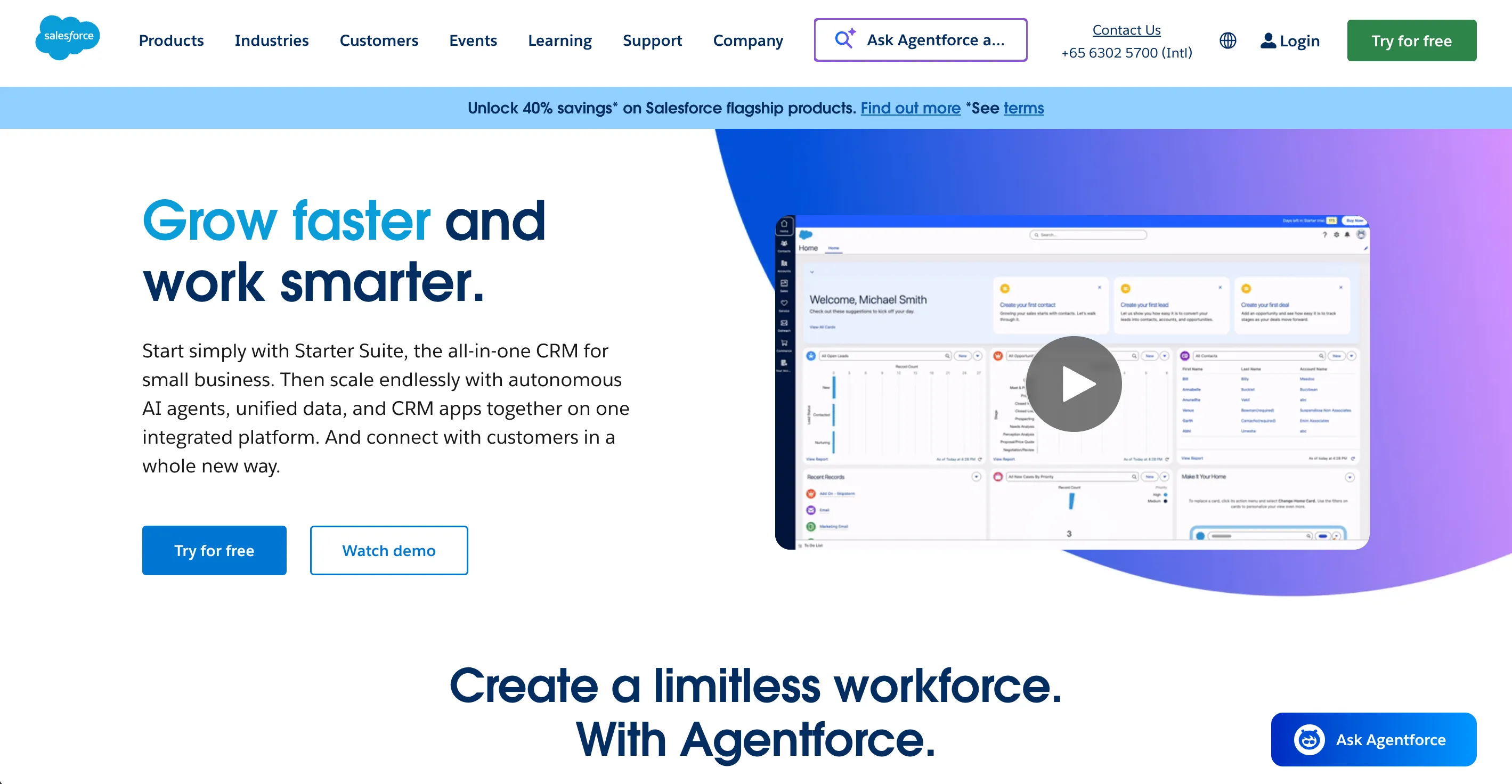
Best for: Enterprises with complex sales operations and large data sets
Salesforce remains the enterprise gold standard for AI-driven CRM performance. Einstein AI automates forecasting, communication tracking, and customer engagement across every stage of the lifecycle.
Key Features:
- Predictive Analytics: Opportunity Insights forecasts deal outcomes using engagement patterns and historical data.
- AI Assistant for Communication: Summarizes calls, drafts personalized outreach, and tracks sentiment.
- AI Bots for Service: Einstein Bots resolve customer queries automatically with conversational AI.
- Custom AI Models: Einstein Prediction Builder enables no-code AI model creation for company-specific metrics.
- Integration Ecosystem: Connects with over 3,000 apps and scales globally.
Drawbacks: Setup is complex and resource-intensive. Full customization and advanced analytics add cost and require skilled administrators.
Pricing: From $25 per user/month (annual billing).
2. HubSpot CRM (Breeze AI)
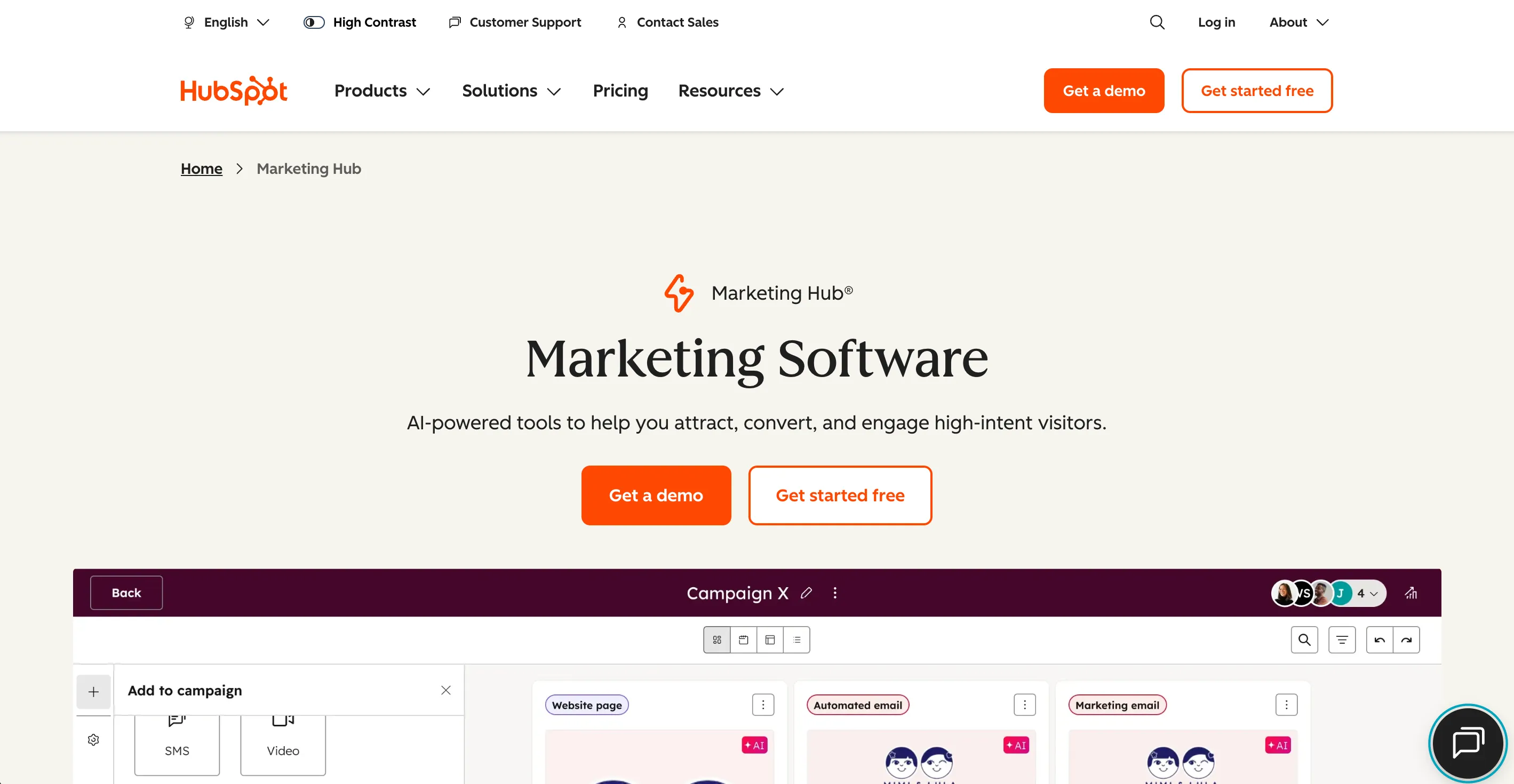
Best for: Mid-size companies looking for an all-in-one growth platform for marketing and sales alignment
HubSpot combines accessibility and power, embedding AI into every stage of its CRM workflow. Breeze AI makes automation and content generation seamless for growing teams.
Key Features:
- Breeze Copilot: Assists with workflow setup, note summarization, and email copywriting.
- Breeze Agents: AI specialists that manage outreach, support, and social automation.
- Predictive Lead Scoring: Prioritizes contacts using engagement and conversion data.
- CRM Integration: Connects sales, marketing, and service channels within one view.
- Ease of Use: Intuitive interface for quick adoption across departments.
Drawbacks: Advanced AI features are often locked behind higher-tier plans. Custom AI modeling is limited.
Pricing: Free plan available; paid plans starting from $9 per user/month.
3. monday.com CRM
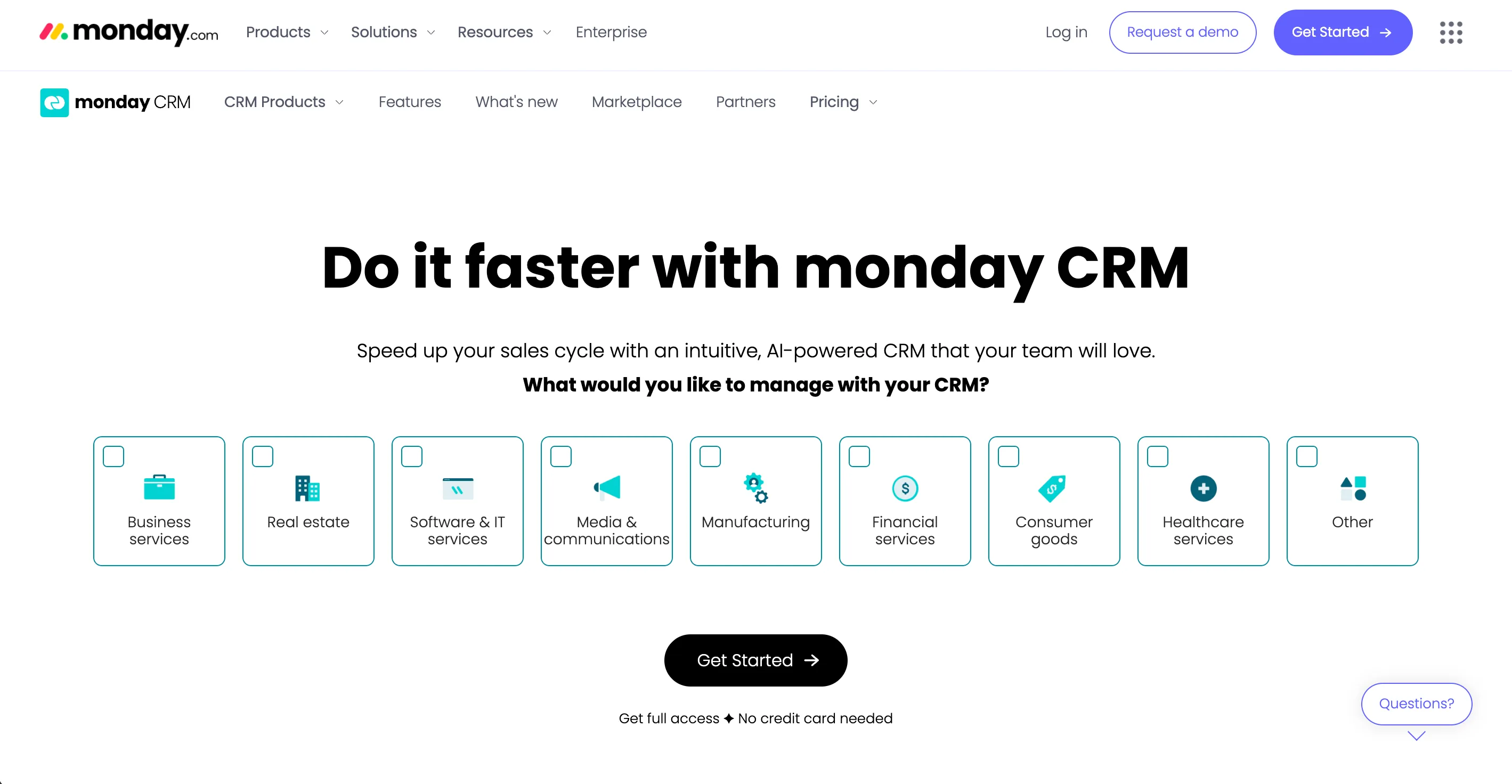
Best for: Teams looking for visual, customizable CRM workflows with AI automation
monday,com CRM turns complex processes into simple visual dashboards. AI features handle repetitive actions and produce actionable insights from customer data.
Key Features:
- AI Automation: Learns repetitive workflows and automates them.
- AI Writing Tools: Draft contextual sales or follow-up emails.
- Sales Forecasting: Predicts results with live data analysis.
- Unified Dashboard: Organizes deals, tasks, and campaigns across teams.
- Integrations: Works smoothly with Google Workspace, Slack, and Outlook.
Drawbacks: Automation depth and predictive analytics are still growing compared to Salesforce or HubSpot.
Pricing: From $10 per seat/month (annual billing).
4. Zoho CRM (Zia AI)
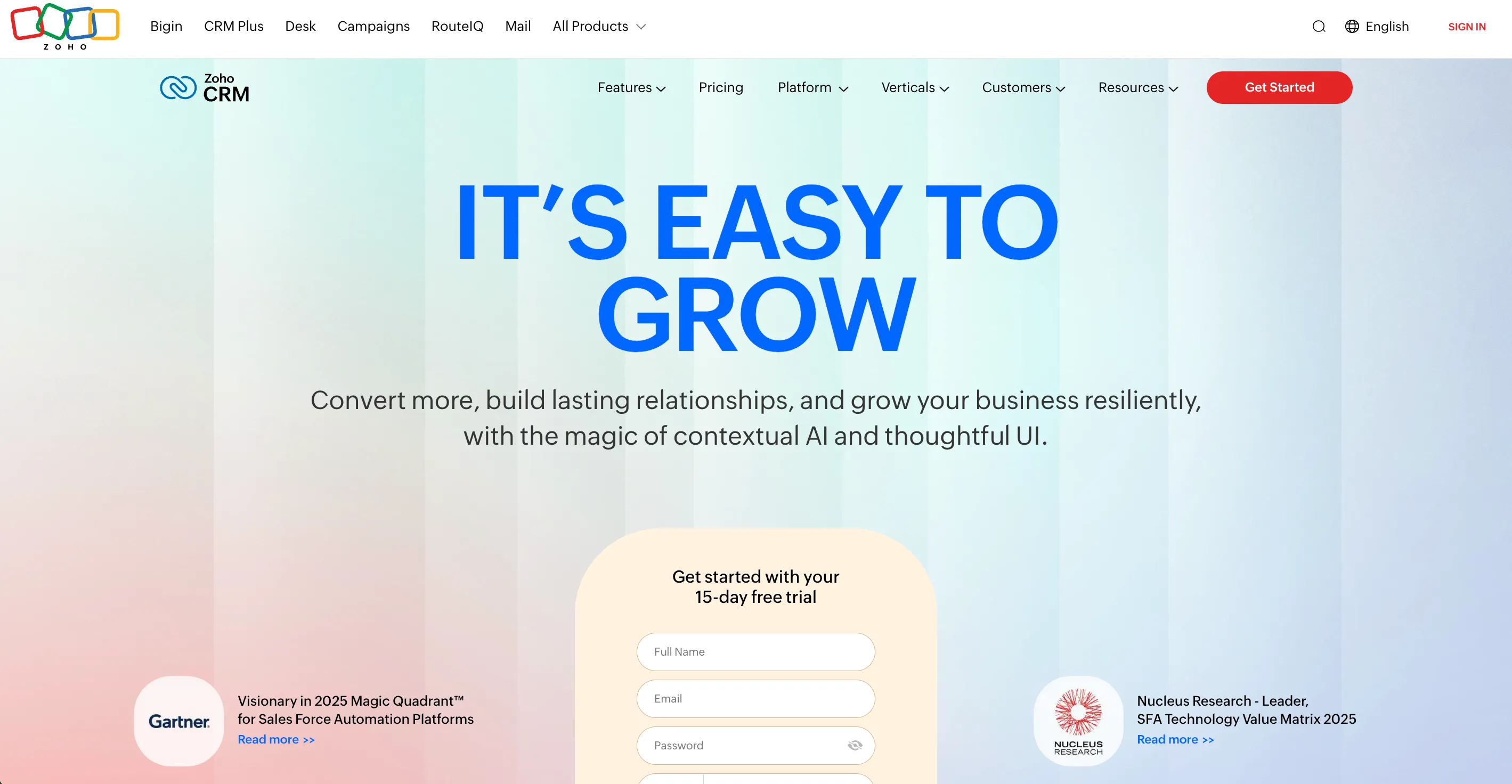
Best for: Small to mid-sized businesses needing affordable automation and analytics
Zoho CRM offers robust AI capability at an accessible price, with Zia AI giving users personalized recommendations, predictions, and conversational access to CRM data.
Key Features:
- Predictive Lead Scoring: Qualifies leads by interaction patterns and engagement signals.
- Conversational AI: Zia responds to voice and text commands for quick data lookups.
- Data Enrichment: Updates incomplete or outdated contact details automatically.
- Workflow Automation: Manages follow-ups, reminders, and record updates.
- Sentiment Analysis: Gauges tone in communication to predict engagement success.
Drawbacks: The interface can feel dated. Some features require time to calibrate against team workflows.
Pricing: From $14 per user/month (annual billing).
5. Pipedrive
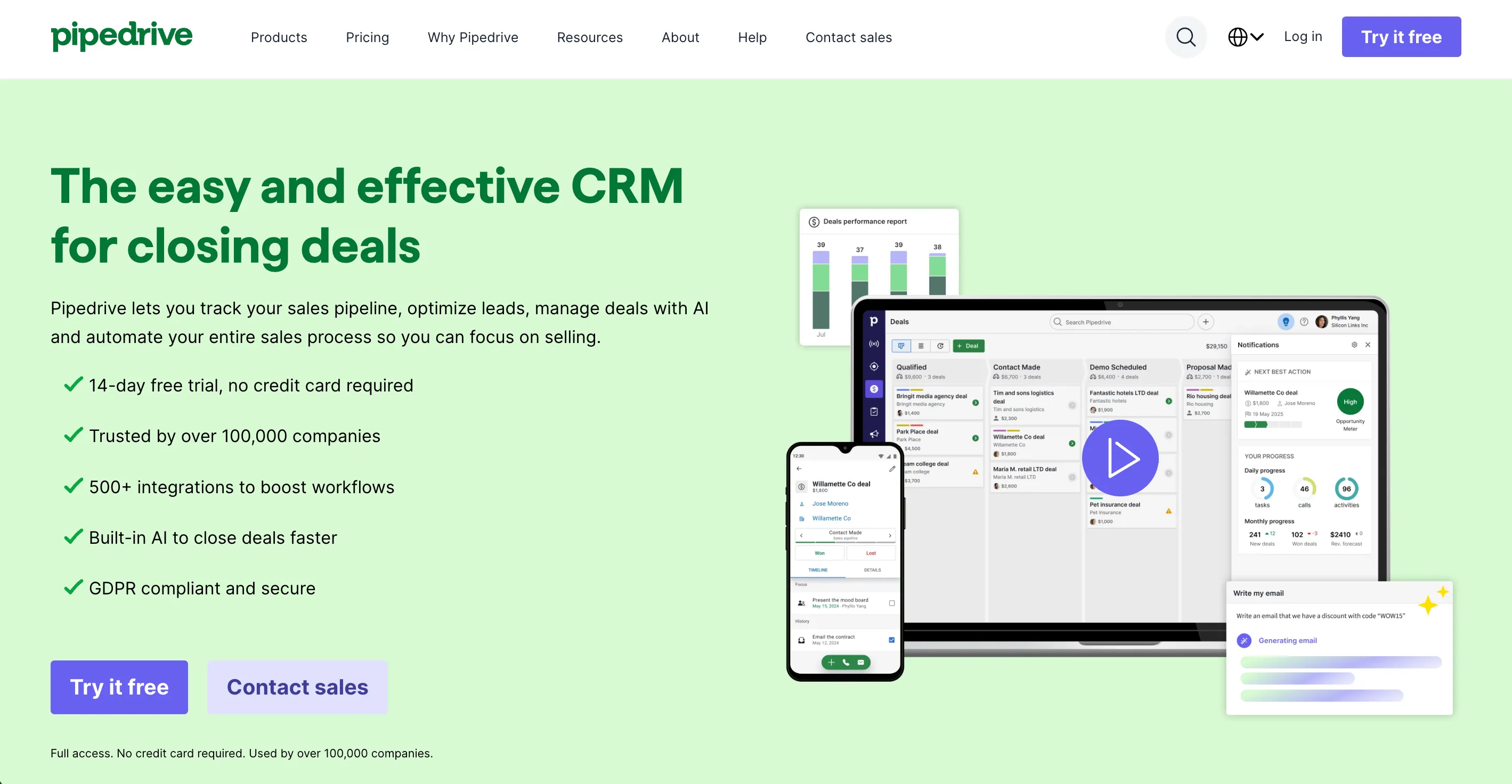
Best for: Sales teams who want simplicity and visual pipeline management with AI support
Pipedrive emphasizes clarity and automation, using AI insights to guide next steps and boost conversion rates.
Key Features:
- AI Sales Assistant: Suggests actions, reminders, and performance insights.
- Smart Email Summaries: Condense conversations for quick reference.
- Pipeline Visualization: Streamlined board layout for tracking progress.
- Predictive Analytics: Forecasts close probabilities across the sales pipeline.
- Workflow Builder: Automates follow-ups and task routing easily.
Drawbacks: Limited marketing automation and customer service tools. Primarily suited for pure sales operations.
Pricing: Starts at $14 per user/month.
6. Vtiger CRM (Calculus AI)
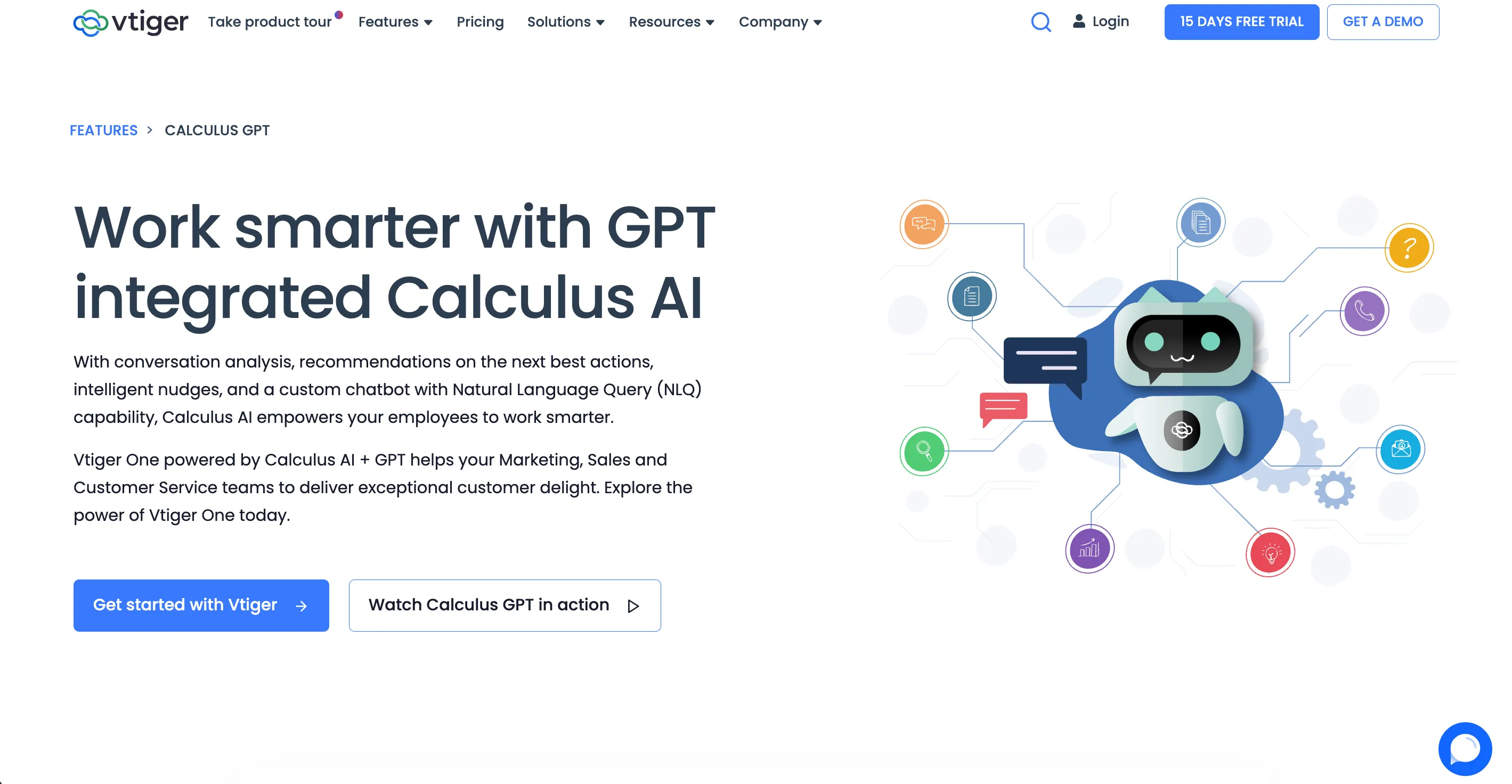
Best for: Mid-market organizations looking for affordable predictive modeling and analytics
Vtiger’s Calculus AI engine brings enterprise-grade insights to growing teams without the overhead cost.
Key Features:
- Predictive Modeling: Forecasts outcomes based on engagement metrics.
- Custom AI Designer: Build proprietary models to match company goals.
- Conversation Analysis: Extracts notes and identifies opportunities from meetings.
- Deal Predictions: Scores pipeline opportunities with probability insights.
- Integrations: Works well with Google Workspace, Teams, and popular marketing apps.
Drawbacks: Interface is less modern than other CRMs. Some automations require manual setup.
Pricing: From $12 per user/month for AI-enabled plans.
7. Freshworks CRM (Freddy AI)

Best for: Fast-growing sales teams looking for instant AI automation and affordable scalability
Freddy AI powers the Freshsales CRM, unifying customer understanding, lead automation, and predictive forecasting in one system.
Key Features:
- AI Lead Scoring: Identifies and prioritizes high-value opportunities.
- Freddy Copilot: Generates personalized emails and follow-up suggestions.
- Predictive Forecasting: Projects future revenue with accuracy.
- AI Chatbots: Handle inquiries and follow-ups across multiple channels.
- Deal Management: Highlights next best actions for conversion.
Drawbacks: Some AI features are limited to higher tiers, and customization is basic for enterprise needs.
Pricing: Plans start at $9 per user/month.
8. Creatio
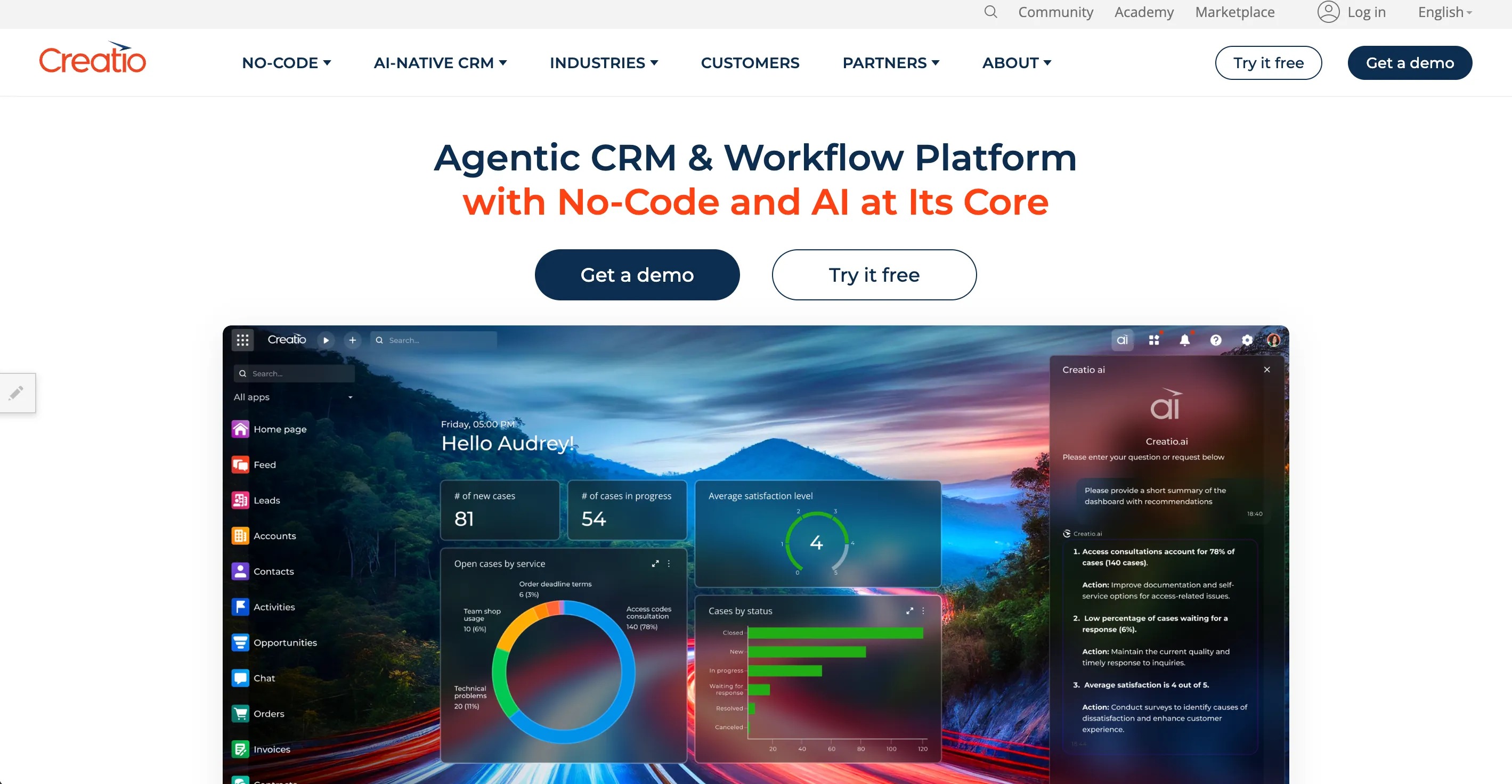
Best for: Businesses needing highly customizable, no-code CRM workflows with AI integration
Creatio’s platform enables teams to tailor automation and AI infrastructure without developer support, combining flexibility with enterprise readiness.
Key Features:
- AI Rules Engine: Recognizes engagement patterns and recommends actions.
- No-Code Workflow Builder: Design intelligent sales and marketing flows.
- Lead Management: Automates scoring, tracking, and nurturing cycles.
- Unified Interface: Connects sales, marketing, and service functions.
- AI Forecasting: Predicts trends and optimizes resource allocation.
Drawbacks: Customization flexibility creates a steeper learning curve and varied setup times.
Pricing: Starting at $25 per user/month, depending on selected modules.
9. Zendesk AI CRM
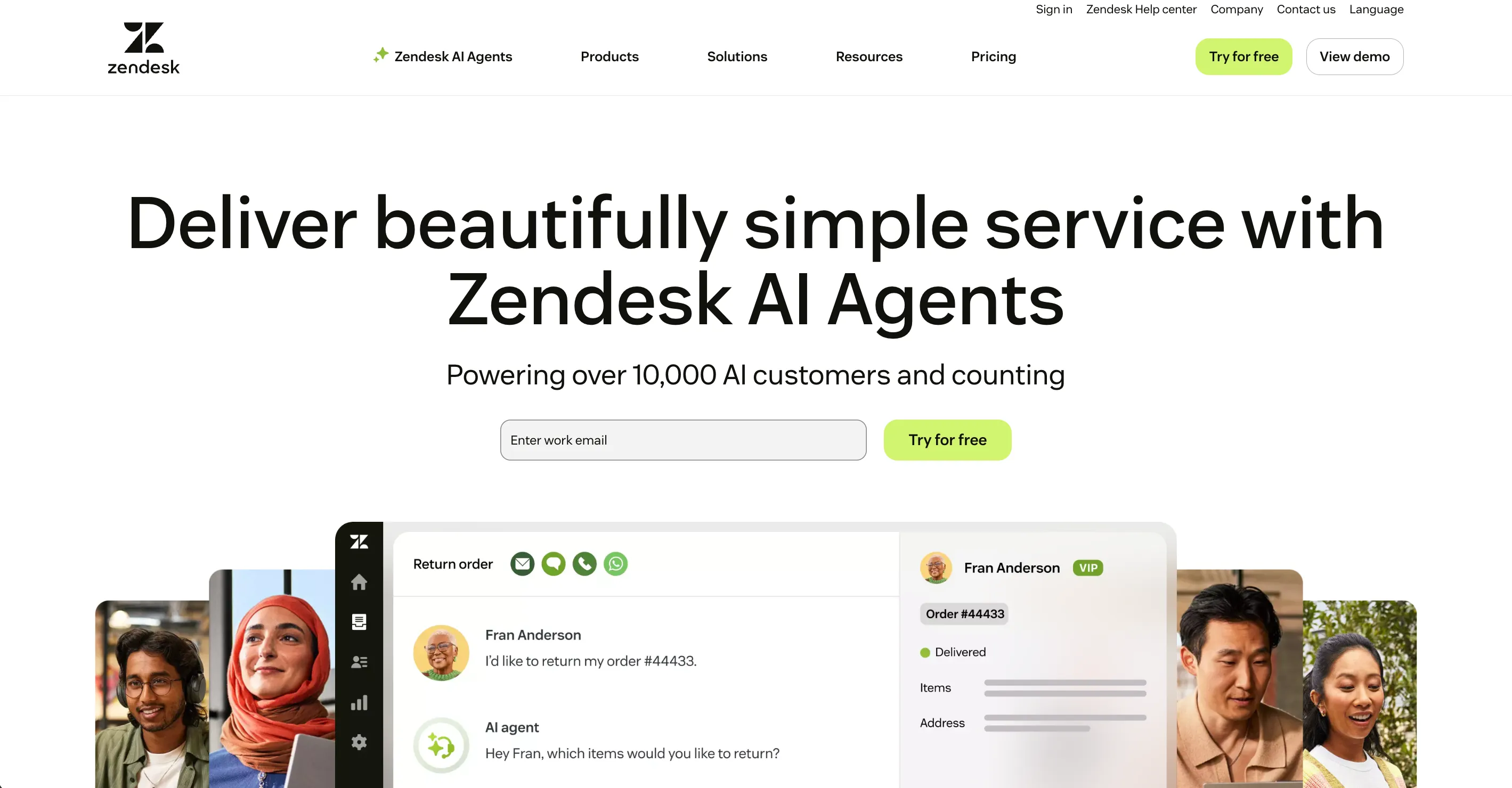
Best for: Companies focused on customer support, retention, and sentiment management
Zendesk combines service excellence with CRM intelligence, using AI to streamline support triage and provide real-time insight into customer sentiment.
Key Features:
- AI Triage and Routing: Directs tickets using language, intent, and urgency analysis.
- Sentiment Analytics: Detects tone to prioritize high-risk accounts.
- Knowledge Base AI: Drafts and optimizes help articles automatically.
- Omnichannel Management: Merges chat, email, SMS, and social messages.
- Performance Dashboards: Track metrics for satisfaction, SLAs, and resolution speed.
Drawbacks: Premium AI features require higher-tier plans. Large data sets can impact speed.
Pricing: From $55 per user/month (billed annually).
10. Zapier (AI CRM Orchestration)
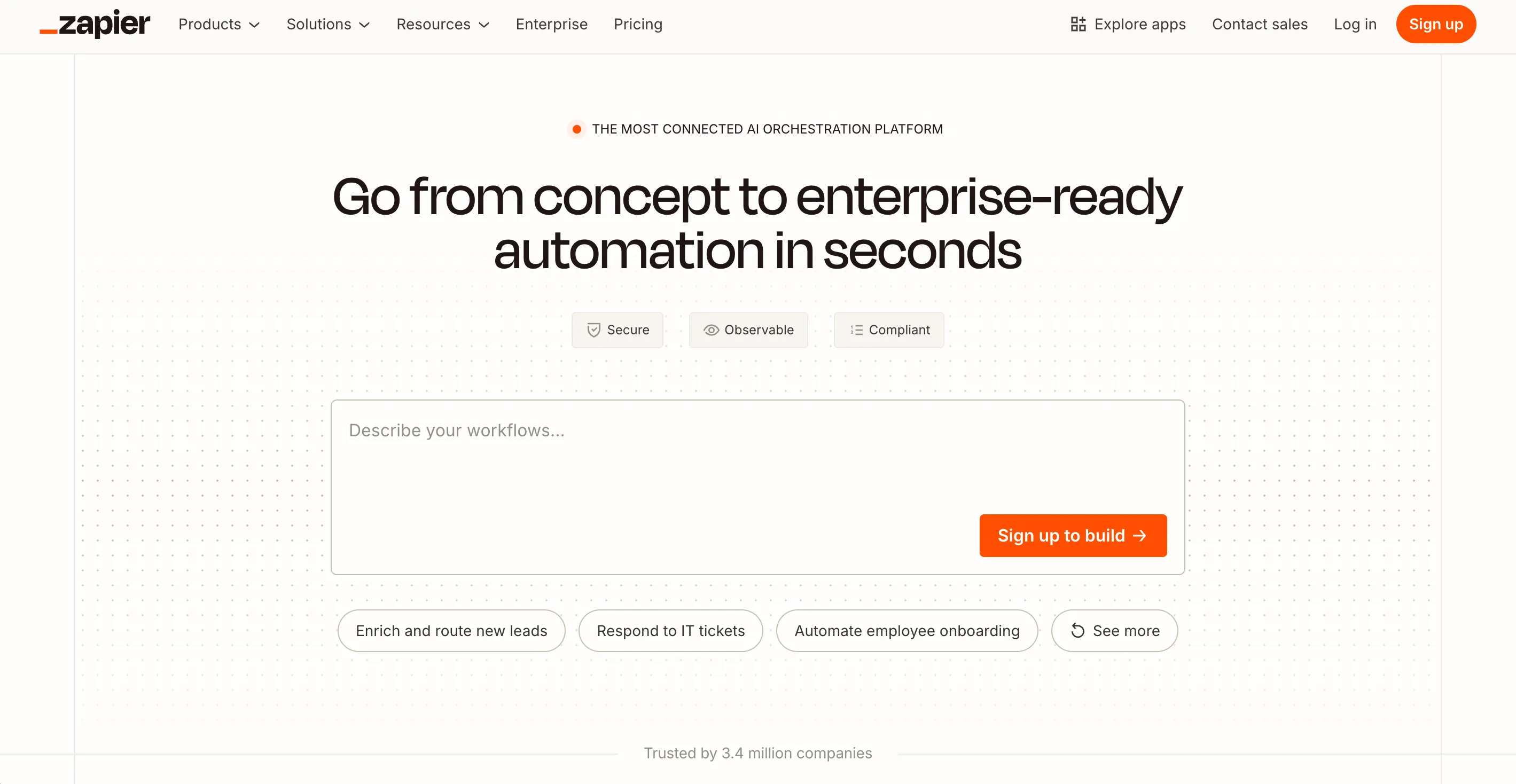
Best for: Teams looking to connect or build their own custom AI-powered CRM through automation
Zapier acts as a flexible automation hub that allows companies to connect data from multiple CRMs and build unified workflows without code.
Key Features:
- AI Workflow Builder: Automates actions across 8,000+ integrated apps.
- AI Agents: Execute tasks or decisions based on text input or triggers.
- CRM Templates: Capture leads, manage deals, and sync data within Zapier.
- Interfaces & Tables: Create CRM-like dashboards and databases.
- Cross-Stack Integration: Connect email, ads, forms, and analytics instantly.
Drawbacks: Requires time to design and maintain automations. Not a traditional CRM platform.
Pricing: Free plan available. AI features from $19.99 per month.
These ten platforms define the new standard for customer relationship management in 2025, powered by intelligent automation, predictive decision-making, and integrated AI capabilities that replace manual workflows with performance-driven execution.
How to Choose the Best AI CRM for Your Business
- Define Your Needs: Small businesses often need simple lead management and automation. Enterprises require complex workflows and integrations. Mid-market teams benefit from platforms balancing sophistication with usability.
- Check Integrations: Match your CRM to your tech stack. For example, HubSpot fits marketing-heavy teams, Salesforce suits complex enterprises, and Vtiger integrates well with Microsoft environments.
- Compare Pricing Models: Evaluate total cost, including setup and training. Some platforms scale pricing quickly as users grow.
- Test AI Features: Use free trials to test prediction accuracy, automation quality, and ease of use. Choose systems your team will actually adopt.
- Prioritize Support and Training: Strong onboarding and documentation accelerate adoption. Look for platforms with dedicated onboarding, responsive support, and clear learning resources.
The Future of AI-Powered Customer Relationship Management
AI CRMs are moving from support tools to full growth engines. They automate daily workflows, surface predictive insights, and shape every customer interaction with relevance and speed. As these platforms continue to evolve, they will anchor how revenue teams operate, connecting data, communication, and execution inside one continuous system.
11x plays a key role at the top of this funnel. Before leads ever reach your CRM, Alice and Julian generate, qualify, and enrich them in real time, giving sales teams a ready-to-convert pipeline rather than a raw contact list. By automating outreach, enrichment, and follow-up, 11x ensures your CRM starts with clean, prioritized opportunities that move faster through the funnel.
To see how 11x can fill your CRM with high-intent leads, book a live demo and experience what autonomous top-of-funnel generation looks like in action.
Frequently Asked Questions
Traditional CRMs act as databases for contact and activity tracking. AI-powered CRMs streamline operations by using artificial intelligence to automate data entry, sales forecasting, and follow-up workflows. They uncover insights from customer interactions, interpret intent, and activate automated responses through integrated AI agents that reduce routine tasks and accelerate how teams close deals.
Yes. AI agents equipped with sentiment analysis and predictive insights continuously monitor engagement to detect churn risks early. They use AI to personalize messaging, send timely follow-ups, and streamline service requests. This consistent responsiveness strengthens customer relationships and drives higher customer satisfaction over time.
AI technology evaluates historical data, deal velocity, and engagement patterns to produce real-time sales forecasting and lead scoring. By automating repetitive analysis, AI agents streamline reporting and give reps clear predictions about which deals to prioritize. These insights guide smarter resource allocation and improve overall win rates.
The choice depends on your industry, team size, and business needs. For example, Salesforce leads in enterprise depth of AI capabilities, HubSpot excels in connecting marketing campaigns and sales workflows, and monday CRM offers an all-in-one system with visual dashboards to streamline collaboration. Each helps teams close deals faster, maintain cleaner data, and strengthen customer satisfaction through intelligent automation.


